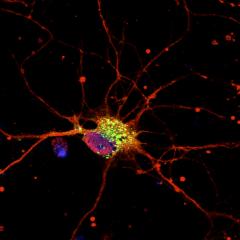What is epilepsy?
Epilepsy is the name given to a condition where a person has recurrent, unprovoked seizures.
Every action in the human body is controlled by coordinated electrical impulses within a network of nerve cells. When nerve impulses in the brain misfire, incorrect information is transmitted resulting in interference in consciousness, thoughts and actions.
There are more than 40 types of epilepsy, which are divided into two groups according to the site of seizure onset. Partial, or focal, seizures begin in a specific region of the brain and predominantly impact parts of the body controlled by the affected area. Generalised seizures begin diffusely in the brain. There is a wide range of seizure symptoms depending on whether they are generalised or focal and where in the brain the seizure starts.
The reason why epilepsy develops is not fully understood. Someone with epilepsy may also have trigger factors that lead to seizures – these include sleep deprivation and excessive alcohol. People with epilepsy are encouraged to keep a seizure diary, to determine whether specific triggers can be identified.
Epilepsy facts
- One in 10 people living in Australia will experience a seizure in their lifetime, with 3-4 per cent being diagnosed with epilepsy
- Traumatic brain injury, meningitis, lack of oxygen during birth and stroke can all lead to epilepsy, but the cause is unknown in half all cases
- 70 per cent of epilepsy cases are controlled with medication
- Epilepsy can be diagnosed at any age, but is most prevalent over the age of 55.
Source: Epilepsy Australia
If you would like more information about epilepsy, or require support, please contact Epilepsy Australia on 1300 852 853.

